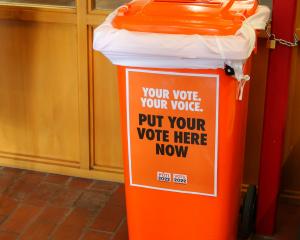
Some of those who put their names forward for the 1605 positions on councils and boards will already know they have been elected because they were unopposed, but the rest will be looking forward to a break from weeks of campaigning.
Whatever the outcomes on Saturday, we should be grateful to those candidates willing to put themselves forward for election, particularly in a climate where displays of vitriol are common on social media, and which can also spill over into public settings. What has not been welcome this election has been those keen to fudge their allegiances to groups promoting disinformation.
Those representatives who decided not to stand again have been rightly recognised for their service. Sadly, those who have not realised it was time to go and may find themselves rejected by voters, will miss out on such accolades.
As usual there has been concern about voter turnout. Numbers are picking up in many areas as October 8 looms, but in other places apathy seems to be alive and well.
It is unfortunate because there are big issues in front of local bodies in the coming term including climate change measures, improving public transport, the aftermath of the Three Waters reforms, resource management reform, Maori representation and the place of Te Tiriti, community housing, and whatever challenges the local government review brings.
Representatives will have to be able to get to grips with both big issues and small.
In recent times, the proportion of people who do not vote in local government elections is much higher than that for general elections, four out of ten, compared with eight out of 10.
Local Government NZ has been campaigning to encourage a greater turnout from young people who traditionally have been less likely to vote than older residents.
Much has been said about young people not voting because, among other things, they cannot grasp the concept of a postal ballot, but as LGNZ says "the great thing about postal voting is that you can sit down with a cuppa and take the time to look at all the candidates, find out what they stand for and make informed decisions".
It also suggested voters set aside time to talk about the elections with whānau and friends.
Electronic voting is proffered by some commentators as a solution to low engagement from youth.
This voting method was available to schools as an option for last month’s triennial board elections, but at this stage details about how many schools tried this, how well it worked and whether it posed any security issues are not available. That information will be worth perusing when it comes to hand since the School Trustees Association asserts school board elections involve the largest number of candidates and voters of any democratic process in the country.
But we might be barking up the wrong tree if we think the voting method is the issue. As Dr Julienne Molineaux said in "Solving and creating problems: Online voting", a 2019 report prepared for the Policy Observatory at Auckland University of Technology: "Online voting is not the silver bullet that will solve falling turnout for local government. Engagement issues and the role, power, structure and conduct of local government are the key issues that need addressing in order to encourage more people to vote".
In the meantime, those procrastinators who have been using their voting papers as coasters can still do their bit for local democracy.
It is past the postal cut-off time, so they will have to don winter woollies and brave the cold snap to hand deliver their voting paper to a ballot box at a council or other specified venue in their area before noon on Saturday. Then they can bathe in a warm virtuous glow.













